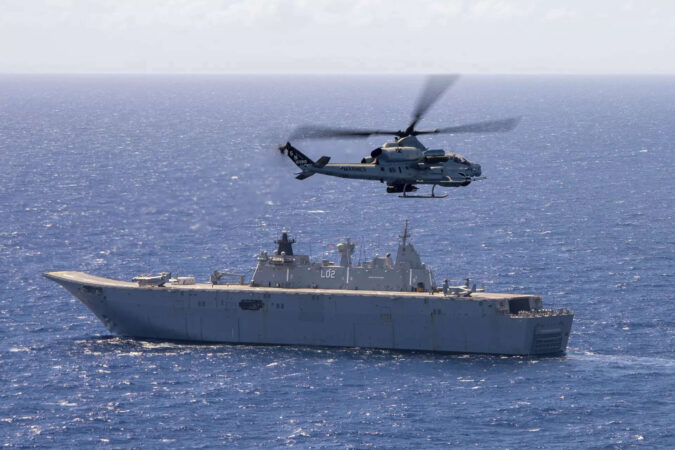CANBERRA: Australia needs to spend more money on defence, make its own munitions and develop the ability to strike longer-range targets as China’s military buildup challenges regional security, according to a government-commissioned review released Monday.
The defence Strategic Review supports the so-called AUKUS partnership between Australia, United States and Britain, who in March announced an agreement to create an Australian fleet of eight submarines powered by US nuclear technology.
Prime Minister Anthony Albanese said his government commissioned the review to assess whether Australia had the necessary defence capability, posture and preparedness to defend itself in the current strategic environment.
“We support the strategic direction and key findings set out in the review, which will strengthen our national security and ensure our readiness for future challenges,” Albanese said in a statement.
The public version of the classified review recommended Australia’s government spend more on defence than the current expenditure of 2% of gross domestic product, improve the Australian defence Force’s ability to precisely strike targets at longer ranges and make munitions domestically.
Other recommendations include improving the force’s ability to operate from Australia’s northern bases and to deepen defence partnerships with key partners in the Indo-Pacific region including India and Japan.
China’s military buildup “is now the largest and most ambitious of any country” since the end of World War II, the review said. And it “is occurring without transparency or reassurance to the Indo-Pacific region of China’s strategic intent,” the review added.
The strategic circumstances during the current review were “radically different” than those in the past, said the review authored by former Australian defence Force Chief Angus Houston and former defence Minister Stephen Smith.
The United States, Australia’s most important defence treaty partner, was “no longer the unipolar leader of the Indo-Pacific,” a region that had seen the return of major power strategic competition, it said.
“As a consequence, for the first time in 80 years, we must go back to fundamentals, to take a first-principles approach as to how we manage and seek to avoid the highest level of strategic risk we now face as a nation: the prospect of major conflict in the region that directly threatens our national interest,” the review said.
For the past five decades, Australia’s defence policy had been aimed at deterring and responding to potential low-level threats from a small or middle-power neighbors.
“This approach is no longer fit for purpose,” the review said.
Australia’s army, air force and navy needed to focus on “delivering timely and relevant capability” and abandon its “pursuit of the perfect solution or process” in its procurements, it said.
The defence Strategic Review supports the so-called AUKUS partnership between Australia, United States and Britain, who in March announced an agreement to create an Australian fleet of eight submarines powered by US nuclear technology.
Prime Minister Anthony Albanese said his government commissioned the review to assess whether Australia had the necessary defence capability, posture and preparedness to defend itself in the current strategic environment.
“We support the strategic direction and key findings set out in the review, which will strengthen our national security and ensure our readiness for future challenges,” Albanese said in a statement.
The public version of the classified review recommended Australia’s government spend more on defence than the current expenditure of 2% of gross domestic product, improve the Australian defence Force’s ability to precisely strike targets at longer ranges and make munitions domestically.
Other recommendations include improving the force’s ability to operate from Australia’s northern bases and to deepen defence partnerships with key partners in the Indo-Pacific region including India and Japan.
China’s military buildup “is now the largest and most ambitious of any country” since the end of World War II, the review said. And it “is occurring without transparency or reassurance to the Indo-Pacific region of China’s strategic intent,” the review added.
The strategic circumstances during the current review were “radically different” than those in the past, said the review authored by former Australian defence Force Chief Angus Houston and former defence Minister Stephen Smith.
The United States, Australia’s most important defence treaty partner, was “no longer the unipolar leader of the Indo-Pacific,” a region that had seen the return of major power strategic competition, it said.
“As a consequence, for the first time in 80 years, we must go back to fundamentals, to take a first-principles approach as to how we manage and seek to avoid the highest level of strategic risk we now face as a nation: the prospect of major conflict in the region that directly threatens our national interest,” the review said.
For the past five decades, Australia’s defence policy had been aimed at deterring and responding to potential low-level threats from a small or middle-power neighbors.
“This approach is no longer fit for purpose,” the review said.
Australia’s army, air force and navy needed to focus on “delivering timely and relevant capability” and abandon its “pursuit of the perfect solution or process” in its procurements, it said.
